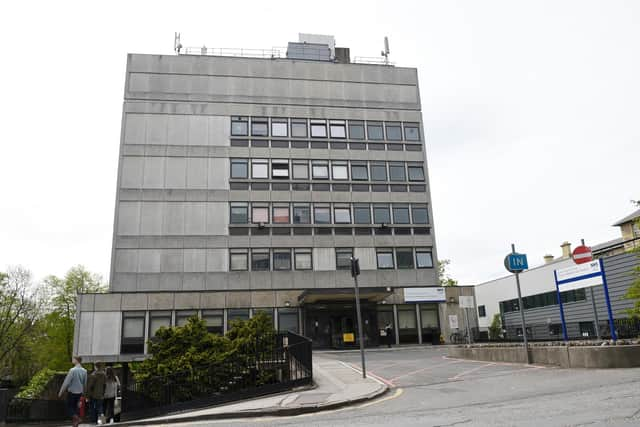Edinburgh's Eye Pavilion: 'Thousands could go blind if services are dispersed'
and live on Freeview channel 276
Let us know what you think and join the conversation at the bottom of this article.
The Macular Society, which supports people living with age-related macular degeneration (AMD), the biggest cause of sight loss in the UK, said scattering services could leave many unable to travel the distances required to attend sight-saving appointments.
Plans to replace the Eye Paviion with a new eye hospital next to the Royal Infirmary at Little France were progressing well until December when the Scottish Government told NHS Lothian it would not fund the project and proposed spreading services throughout Lothian instead.


Advertisement
Hide AdAdvertisement
Hide AdThe decision sparked a public outcry and cross-party calls for a rethink. During the election campaign the SNP said it would fund a new hospital if NHS Lothian wanted it. MSPs have now written to new Health Secretary Humza Yousaf asking for more details on how the pledge will be taken forward
Currently, the Eye Pavilion provides thousands of people affected by AMD with sight-saving eye injections, which they need typically every two to three months. The Macular Society said without the treatment patients could lose their sight within a matter of weeks.
Hazel McFarlane, the charity’s senior regional manager for Scotland, said: “A significant proportion of people attend their eye clinic appointments accompanied by a family member, friend or carer.
“Should eye-care services be dispersed, this will lead to increased levels of irreversible and untreatable sight loss, because those with AMD who are unable to drive will either be unable to travel the distances required to attend their appointments, or they will decline treatment because of the arduous and lengthy journeys they will have to undertake.”
Advertisement
Hide AdAdvertisement
Hide AdAnd she said continuity of care for these elderly patients should be a priority.
“Being seen and treated by familiar, trusted ophthalmologists and nurse Injectors who have expert knowledge of their individual patients’ treatment history is vital for people diagnosed with a sight-threatening condition such as AMD, where often the practical and emotional impact is immense.”
Cleodie Mackinnon, 85, leader of the Macular Society’s Edinburgh Stockbridge group, said many members were deeply grateful for the regular injections they receive at the Eye Pavilion.
“We know we’re going to a centre of excellence and having that is what matters. We all have great faith in it. It’s internationally known and that’s important to all of us. We’re aware that important research goes on there and several of us have been involved in clinical trials. We know when new discoveries are made we will have access to the treatments as soon as they are available. We cannot lose this. Any dispersing of its services would be likely to result in a lowering of standards, which could negatively affect our sight.
Advertisement
Hide AdAdvertisement
Hide Ad“Although there’s no treatment for me, I know at the moment that if anything changes it’ll be spotted at once.”
Bal Dhillon, professor of clinical ophthalmology at Edinburgh University, said a centrally-located teaching hospital was crucial in continuing to provide high-quality diagnosis and treatment to patients affected by AMD.
He said: “NHS Lothian and the University of Edinburgh work hand-in-hand to support patients with AMD and other complex diseases, which severely impact their sight and quality of life. A centrally-located teaching hospital to continue our medical and surgical ophthalmology work is essential both now and for future-proofing services in the region.”
The Macular Society says nearly 1.5 million people across the UK are currently affected by macular disease with many more at risk. The disease can have a devastating effect on people’s lives, leaving them unable to drive, read or see faces. Many living with macular disease experience increased feelings of loneliness and isolation. There is still no cure and most types of the disease are not treatable. AMD is the most common form, usually affecting people over the age of 50.
A message from the Editor:
Thank you for reading this article. We're more reliant on your support than ever as the shift in consumer habits brought about by coronavirus impacts our advertisers.
If you haven't already, please consider supporting our trusted, fact-checked journalism by taking out a digital subscription.
Comment Guidelines
National World encourages reader discussion on our stories. User feedback, insights and back-and-forth exchanges add a rich layer of context to reporting. Please review our Community Guidelines before commenting.
